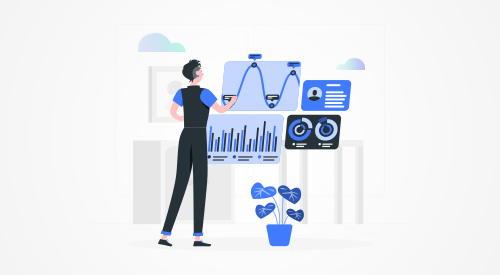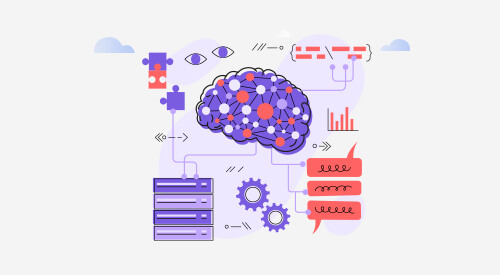

Organizations of all sizes and across industries in Singapore are harnessing the power of data to make informed decisions, gain competitive advantages, and enhance overall performance. Automation in data analytics in Singapore has evolved from being a valuable asset to a strategic necessity for modern businesses. Here, we will look at revolutionizing data analytics with the power of automation.
Automate the grind & elevate your insights with Niveus!
Data analytics involves the process of examining large datasets to uncover hidden patterns, trends, and insights that can drive business decisions. It encompasses a wide range of techniques, from basic data analysis and reporting to advanced predictive modeling and machine learning.
Data Analytics in Singapore
In recent years, Singapore has emerged as a global hub for innovation and technology adoption, and businesses in the city-state are increasingly recognizing the pivotal role that automation plays in driving efficiency and competitiveness. When it comes to data analytics, automation has become a game-changer for Singaporean businesses across various industries.
One of the primary ways Singaporean businesses are utilizing automation in data analytics is by harnessing the power of machine learning and artificial intelligence (AI) algorithms. These sophisticated technologies are capable of processing massive datasets at remarkable speeds, uncovering intricate patterns and insights that would be nearly impossible to discern through manual analysis. For example, financial institutions in Singapore are using automated algorithms to detect fraudulent transactions in real-time, safeguarding their clients’ assets and ensuring compliance with regulatory requirements.
Moreover, Singapore’s logistics and supply chain management sector has been quick to embrace automation in data analytics. Companies operating in this space are using automated data collection tools such as IoT sensors and RFID technology to track inventory and monitor the condition of goods in transit. These technologies enable them to optimize routes, minimize delays, and enhance the overall efficiency of the supply chain, which is crucial for a trade-driven economy like Singapore.
In the realm of e-commerce, Singaporean businesses are leveraging automation to personalize customer experiences. By analyzing vast amounts of data from online interactions, automated systems can recommend products tailored to individual preferences, thereby increasing customer satisfaction and driving higher sales.
Another notable area where automation is making significant inroads is in healthcare. Singapore’s healthcare institutions are using automated data analytics to improve patient care and optimize resource allocation. Machine learning algorithms can help predict disease outbreaks, optimize hospital bed occupancy, and even assist in medical diagnosis by analyzing patient data and medical records.
Furthermore, Singaporean government agencies are actively promoting the adoption of automation in data analytics. Initiatives such as the Singapore Smart Nation program aim to create an ecosystem where data is efficiently collected, securely managed, and analyzed to drive innovation in various sectors, including transportation, healthcare, and public services.
Data Analytics in Today’s Business Landscape
In the current business landscape, data analytics serves as the compass guiding organizations through the complexities of their markets. It empowers them to:
- Improve Decision-Making: By providing data-driven insights, organizations can make informed decisions, reduce uncertainty, and mitigate risks.
- Enhance Customer Experiences: Understanding customer behavior through data analytics helps tailor products and services to meet specific needs, leading to higher customer satisfaction and loyalty.
- Optimize Operations: Data analytics identifies areas where efficiency can be improved, cost savings can be realized, and resources can be allocated more effectively.
- Gain a Competitive Edge: Businesses can outmaneuver competitors by using analytics to identify emerging market trends and capitalize on new opportunities swiftly.
The Role of Automation in Transforming Data Analytics
While data analytics has been a game-changer in the business world, the exponential growth of data has posed significant challenges. Analyzing vast amounts of data manually is not only time-consuming but also prone to errors. This is where automation steps in to revolutionize the field.
Automation in data analytics refers to the use of technology and algorithms to perform data-related tasks with minimal human intervention. It’s like having a tireless, lightning-fast assistant that can handle the most tedious and repetitive data analysis tasks effortlessly. Automation has taken data analytics to new heights by:
- Accelerating Insights: Automation processes data much faster than humans can, enabling organizations to get insights in near-real-time.
- Ensuring Consistency: Automated processes follow predefined rules consistently, reducing the chances of errors and ensuring data accuracy.
- Handling Big Data: With the exponential growth of data, automation is crucial for handling large datasets efficiently and extracting valuable insights from them.
The Benefits of Automation in Data Analytics
As we delve deeper into the realm of automation in data analytics, it becomes increasingly evident that its impact is nothing short of transformative. In this section, we will explore the myriad benefits that automation brings to the table, which extend far beyond just operational convenience.
Improved Efficiency and Productivity
Reduction in Manual Data Processing: One of the most noticeable advantages of automation in data analytics is the dramatic reduction in manual data processing. Traditionally, data analysis involved hours, if not days, of painstaking manual work. Automation swoops in as a superhero, automating routine tasks such as data extraction, cleaning, and transformation. This not only saves precious time but also liberates human resources for more creative and strategic endeavors.
Quick Insights and Decision-Making: Time is often of the essence in the business world. Automation doesn’t just save time; it accelerates the entire analytical process. With automated data pipelines and algorithms, insights are generated at lightning speed. This means that decision-makers can access critical information in near-real-time, enabling agile responses to changing market conditions and opportunities. In a world where being the first to act can be a significant advantage, automation becomes a catalyst for competitiveness.
Enhanced Accuracy and Data Quality
Minimizing Human Errors: Humans, while skilled and capable, are not infallible. Mistakes can creep into data analysis through oversight, fatigue, or even simple human error. Automation, on the other hand, executes tasks with unwavering precision, reducing the likelihood of errors to almost zero. This not only improves the reliability of insights but also instills confidence in the decision-making process.
Consistency in Data Analysis: Consistency is key in data analysis. Manual processes can vary in quality and rigor, leading to inconsistent results. Automation enforces a standardized approach to data analysis. It applies predefined rules and algorithms consistently across all data points, ensuring that every piece of data is treated the same way. This consistency is particularly important when dealing with historical data or comparing data over time.
Scalability and Handling Large Datasets
Dealing with Big Data: In the era of big data, the volume, velocity, and variety of data have grown exponentially. Human capacity alone is insufficient to handle these massive datasets effectively. Automation, however, thrives in the face of big data challenges. It can effortlessly scale to accommodate large volumes of information, performing analyses that were previously inconceivable. This scalability opens the door to uncovering deeper insights and extracting hidden patterns that might otherwise remain buried.
Real-time Data Processing: The business landscape is becoming increasingly dynamic, and decisions often need to be made in real-time. Automation enables organizations to process data as it arrives, providing up-to-the-minute insights. For industries like finance, e-commerce, and IoT, where real-time decision-making is crucial, automation is an invaluable asset. It allows for the monitoring of key performance indicators (KPIs) and the immediate detection of anomalies or trends, which can be acted upon promptly.
In essence, these benefits pave the way for organizations to make more informed decisions, achieve operational excellence, and gain a competitive edge in an ever-evolving business landscape.
Implementing Automation in Data Analytics
Now that we’ve explored the incredible benefits of automation in data analytics, it’s time to roll up our sleeves and delve into the practical aspects of implementing automation effectively. This section will provide valuable insights into the steps and considerations involved in harnessing the power of automation for your data analytics endeavors.
Choosing the Right Tools and Technologies
Overview of Popular Automation Tools: The first step in your automation journey is selecting the appropriate tools and technologies. There’s a diverse landscape of automation tools available, each with its strengths and capabilities. Some popular choices include ETL (Extract, Transform, Load) tools like Apache NiFi, data integration platforms, and cloud-based services.
Integration with Existing Analytics Platforms: Many organizations have existing data analytics platforms in place. The seamless integration of automation tools with these platforms is crucial for a smooth transition to automated workflows. With Niveus, businesses can explore strategies and best practices for integrating automation tools into their current analytics ecosystem, ensuring minimal disruption and maximum efficiency.
Developing Automation Workflows
Designing Data Pipelines: Data pipelines are the backbone of automation in data analytics. These pipelines define the flow of data from source to destination, encompassing data extraction, transformation, and loading. With Niveus, businesses can delve into the intricacies of designing efficient and scalable data pipelines, emphasizing factors such as data source compatibility, data format standardization, and error handling mechanisms.
Automating Repetitive Tasks: Automation excels at handling repetitive and labor-intensive tasks. In this subsection, we will explore the specific tasks that can be automated within the data analytics process. This includes automating data ingestion from multiple sources, data cleaning and validation, as well as routine reporting and visualization. By automating these tasks, you can free up valuable human resources for more strategic and creative aspects of data analysis.
Ensuring Data Security and Compliance
Data Privacy Concerns: As data analytics become more automated, data privacy concerns come to the forefront. Mishandling sensitive data can have legal and reputational consequences.
Compliance with Regulations: Data analytics often involves handling data subject to various regulations, such as GDPR (General Data Protection Regulation) and HIPAA (Health Insurance Portability and Accountability Act). Ensuring compliance with these regulations is non-negotiable.
In the implementation phase of automation in data analytics, the choices you make regarding tools, workflows, and compliance measures are critical. By following best practices and understanding the nuances of these decisions, you can harness the full potential of automation while safeguarding data integrity and compliance. The next step is to put your knowledge into action and embark on your automation journey with confidence.
As we move forward in this data-driven era, the ability to harness the power of data analytics and automation will be a defining factor in an organization’s success. It’s a journey that requires ongoing learning, adaptation, and a commitment to using data responsibly and ethically. The landscape of data analytics will continue to evolve, and those who embrace automation with Niveus will be well-positioned to thrive in this exciting new era of data-driven business.









